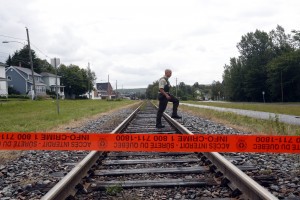Surprise Inspections Examine Safety Of Shipping Bakken Crude By Rail

EPA/STEPHEN MORRISON /LANDOV
A Quebec Provincial Policeman crosses the railway tracks inside the exclusion zone in the town of Lac Megantic, Quebec. Hundreds of residents were evacuated from their homes when a runaway train loaded with crude oil exploded on July 6.
The feds are calling it the “Bakken Blitz.”
Inspectors with the Federal Railroad Administration and the Pipeline and Hazardous Materials Safety Administration have begun surprise inspections of rail cars carrying fracked oil from the Bakken Shale in North Dakota.
It’s the same crude that is being hauled on trains to a refinery complex Philadelphia and that was on a train that derailed and exploded in Lac-Mégantic, Quebec earlier this summer, killing 47 people and leveling parts of the town.
The inspections began at oil loading facilities, mainly in North Dakota this week in order to ensure that trains are properly staffed and the manifests match the actual amount of crude in the cars.
More from RailwayAge magazine:
The review primarily involves shipments from the Bakken; its activities include unannounced spot inspections, data collection, and sampling, as well as verifying compliance with federal safety regulations. The activities are taking place at strategic terminal and transloading locations that service crude oil.
Planning for the inspections started in March—well before Lac-Mégantic—following FRA audits and PHMSA field observations that found inconsistencies with crude oil classification, the agencies said.
“We need to make sure that what is in those tankers is what they say it is,”PHMSA Administrator Cynthia Quarterman told RailwayAge. “FRA and PHMSA together are going out with our inspection teams looking at crude in these cars and measuring them and ensuring that the quality of the crude that is being carried is what the shipping papers say it is.”
In a statement, Quarterman said the need for such oversight is greater than ever as hazardous materials are being shipped in greater quantities via rail and pipelines.
Rail shipments of crude oil and petroleum products has nearly doubled over the last year in response to the nationwide shale oil and gas boom.
















